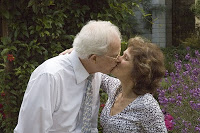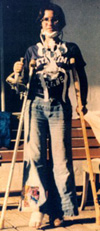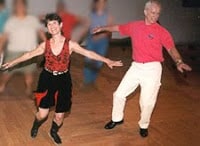Prayers for Bobby today: Gay kids committing suicide
Gay teens are killing themselves — two 13-year-olds due to bullying (see this terrific blog post by Sue Katz), and a college student whose tryst was videoed and put online. It sickens me that young people just discovering their sexuality feel so vulnerable that it’s easier to die than to live. Those of us who have lived long enough to know ourselves, accept ourselves (including our sexuality — whatever its stripes or colors), and find or create a community that lets us live fully and honestly have a responsibility to pass this along to young people.
That’s how Leroy Aarons felt at age 61, and that’s why I’m repeating the following post from January 2009. I don’t know if you can find the Lifetime movie now, but the book is as valuable now as the day it was written. Please read it, then pass it along to someone who needs it. A life may depend on it.
Here’s what I wrote in January 2009:
 At age 61, prizewinning journalist Leroy Aarons discovered the true story of Bobby Griffith, a story so gripping that he devoted himself to retelling this story in novel form.
At age 61, prizewinning journalist Leroy Aarons discovered the true story of Bobby Griffith, a story so gripping that he devoted himself to retelling this story in novel form.
His book, Prayers for Bobby, has inspired a movie premiering on Lifetime TV, Saturday, January 24, 2009. It is the riveting true story of teenager Bobby Griffith, who back-flipped off a freeway overpass into the path of a tractor trailer at age 20 because he could not accept his homosexuality. Prayers for Bobby chronicles Bobby’s angst at growing up gay in a fundamentalist Christian family and an anti-homosexual social and school environment. Aarons gently and lovingly pieces together Bobby’s life, fears, hopes and, finally, hopelessness, with the help of the five year diary he left, his legacy.
Prayers for Bobby (subtitle: A Mother’s Coming to Terms with the Suicide of Her Gay Son) is also the story of Mary Griffith, Bobby’s mother, played by Sigourney Weaver in the Lifetime movie. A staunch, one-tracked fundamentalist, Mary was convinced that if she and Bobby just prayed enough, and if Bobby tried hard enough, God would cure him of his homosexuality. She prayed, she nagged Bobby relentlessly, she shamed him, she put Bible quotes on the mirror for him to see when he wakened. Too late, Mary finally realized with a thunderbolt of insight that the reason God had refused to cure Bobby was that there was nothing wrong with him.
What does this have to do with our age group? Plenty. Think about how we had to discover our own sexual and sensual natures despite the mores of our restrictive society in an era that condemned what seemed our most natural feelings and desires. Imagine being trapped in a world that didn’t understand you at a time you couldn’t even understand yourself. And reach out.
If you think you don’t know any closeted gay teenagers, it’s only because they are closeted. Maybe your “Bobby” is your grandson, or your granddaughter’s best friend, or the neighbor kid, or the quiet boy at church. We’ve learned a lot about life and about sexuality in the decades we’ve been living on this earth, and part of it is to accept ourselves and open ourselves to younger folks who might need a role model, a listening ear, and a warm “so good to see you today.”
Please see the movie, and read the book, which goes into much more detail and will haunt you in a beautiful way.
I am proud that I knew Leroy Aarons until his death four years ago, called him my friend Roy, and still enjoy a close friendship with Joshua Boneh, his surviving spouse. Please check out the website that Joshua and Roy’s friends have constructed in Roy’s memory and to celebrate the movie that he always hoped would be made about his book.
 (photo of Leroy Aarons and Joshua Boneh)
(photo of Leroy Aarons and Joshua Boneh)
Betty Dodson at 81: “out loud and sex-proud”
Betty Dodson has influenced my thinking and my sexual self-acceptance for decades. Her 1974 book, Liberating Masturbation: A Meditation on Self-Love, morphed into Sex for One: The Joy of Selfloving. At 69, Betty met a young man of 22 who arrived for a weekend and stayed ten years, inspiring Orgasms for Two: The Joy of Partnersex. Her most recent book is her memoir, Betty Dodson: My Sexual Revolution, available as a Kindle edition.

Betty, with sidekick and business partner Carlin Ross, runs a website where she answers sex questions from readers, posts articles and videos, and displays the famous Genital Art Gallery, which aims to show all of us that we’re just perfect the way we are, “a research project where both women and men can share as well as appreciate the vast diversity of our magnificent sex organs.”
I am deliriously happy that this icon of candid sexuality wrote the foreword to my new book, Naked at Our Age: Talking Out Loud about Senior Sex! In it, she talks about how her sexuality changed through the decades, and how, at 81, she’s still “out loud and sex-proud.”
I have to admit it — I got shivers when I read the latest email from Betty, where she addressed me as “Sister Warrior.” It doesn’t get much better than that!
(To be notified when Naked at Our Age: Talking Out Loud about Senior Sex is available, please email me and I’ll put you on the notification list. I will not spam you, sell or share your information, or in any way abuse your trust.)
Olive Kitteridge
I loved reading Olive Kitteridge, winner of the 2009 Pulitzer Prize for Fiction. The book is a masterful anthology of short stories, linked together so that they become a novel. Characters from one story reappear in another at a different time of life, and as we learn more about Olive, her husband Henry, their son Christopher, and other people who weave through their lives, we piece together a patchwork of lives, dreams, pivotal moments, and regrets. The book is deeply engrossing, insightful, and often disturbing.
I’m always looking for literary fiction with strong older characters for whom sexuality is an accepted part of their emotional lives. Their sexual feelings or activities don’t have to be blatent, just acknowledged (by the author if not by the character) as normal and expected. Olive Kitteridge delivers, especially in the final story, “River,” where Strout narrates the feelings of the now widowed, 74-year-old Olive who is about to go to bed with a new man:
Oh, what young people did not know. They did not know that lumpy, aged, and wrinkled bodies were as needy as their own young, firm ones… [I]f love was available, one chose it, or didn’t choose it… But here they were, and Olive pictured two slices of Swiss cheese presssed together, such holes they brought to this union–what pieces life took out of you. Her eyes were closed, and throughout her tired self swept waves of gratitude–and regret.
I loved Olive Kitteridge so much that as soon as I’d finished, I wanted to start reading it again, now that I knew more about the characters. I also wrote a fan email to the author, Elizabeth Strout, which she graciously answered. (As an author, I know what a solitary endeavor it is to write books, and I always appreciate hearing from readers, so I hoped Ms. Strout felt the same.)
 I was thrilled to learn that two of the stories from this book would be performed at Z Space in San Francisco as part of the Word for Word series, and I rushed to see it on opening night. The script was not an adaptation but a staged, dramatic performance of the stories verbatim (hence the name, “Word for Word”).
I was thrilled to learn that two of the stories from this book would be performed at Z Space in San Francisco as part of the Word for Word series, and I rushed to see it on opening night. The script was not an adaptation but a staged, dramatic performance of the stories verbatim (hence the name, “Word for Word”). If you’re in the San Francisco area, I hope you’ll catch this play, now playing through September 26, 2010, then read the book.
All I Really Love About Life, I Learned After Age 50
Before age 50, I had a pretty good life. I loved my job teaching high school. I had discovered the joy of exercise, which eluded me before age 30. After a near-fatal automobile accident at 34, I turned life’s lemons into lemonade by morphing the fitness habit that had saved my life into new careers: writing magazine articles about health and fitness and teaching aerobic dance. By age 47, I had written a book.
I wasn’t so lucky in love. I had been married and unmarried to a very good man, who remains a close friend, then had a 25-year string (string? more like a giant ball of yarn!) of involvements – long-term, short-term, and casual. All warm and joyful, but not the love I sought.
At menopause, overheated and haggard from sleep deprivation, I switched from teaching sweaty aerobics at the crack of dawn to contemporary line dancing at dusk. That switch turned out to change my life… more about that in a moment.
Before age 50, I struggled to figure out who I was and wanted to be, and battled my way there. After age 50, that became easy. Rather than needing emotional kung fu to battle my way to authenticity, I could use a softer aikido approach and let what I didn’t want flow away.
After age 50, I understood that joy blossomed through living fully, whether I was single or coupled at the moment – learning new things, teaching (now in health clubs, dance halls and speaking engagements instead of high schools), keeping my own body fit and strong, interacting honestly and helpfully with others, and writing professionally. I wrote six more books after age 50!
I still hoped I’d find that special man to love, but I wasn’t putting my life on hold waiting. I realized I had to be the person I was looking for.
 After five years of loving each other, Robert and I married. We knew he had cancer. We didn’t know we’d have only two more years together. I learned after 50 that we must treasure our loved ones while we have them, because at our age, we will lose them, or they will lose us. We must love fully and joyfully while we can.
After five years of loving each other, Robert and I married. We knew he had cancer. We didn’t know we’d have only two more years together. I learned after 50 that we must treasure our loved ones while we have them, because at our age, we will lose them, or they will lose us. We must love fully and joyfully while we can.I also learned how fragile we are, even when we do everything possible to keep our bodies and minds strong. On June 20, I tripped, slammed to the floor, and shattered my shoulder in ten places. My new book, Naked at Our Age: Talking Out Loud about Senior Sex, was due to Seal Press five weeks later. I had put the book on hold for a year after losing Robert, when grief was my day job. Then I had spent the next year writing it. Darned if I would blow off my deadline for a broken shoulder! I finished the book – on time! – typing with my arm in a sling, measuring out pain killers so that I could focus.
Resilience: that’s the major lesson I learned after 50 and continue to learn at age 66. Life continues to amaze me. What delights are next?
Note from Joan Price: I’m trying to blog my way to the AARP Orlando@50 conference. This blog post is an entry in their competition to find the official blogger to travel to and cover the event. Find out more about the conference here.


